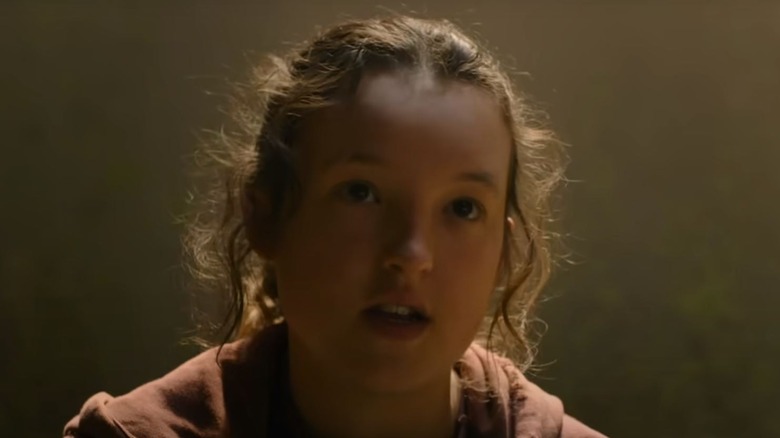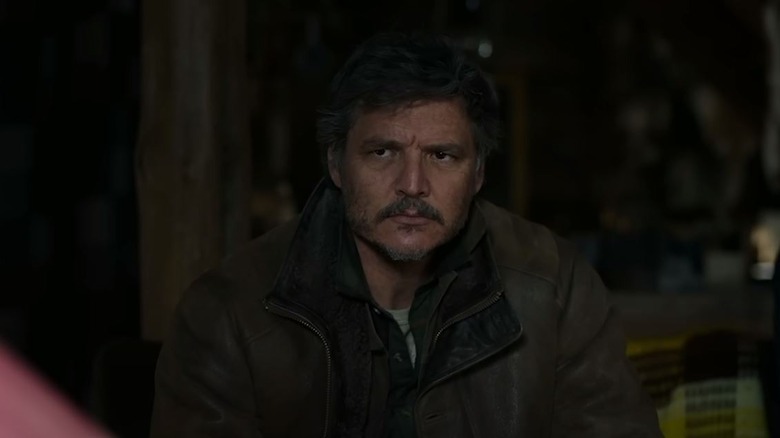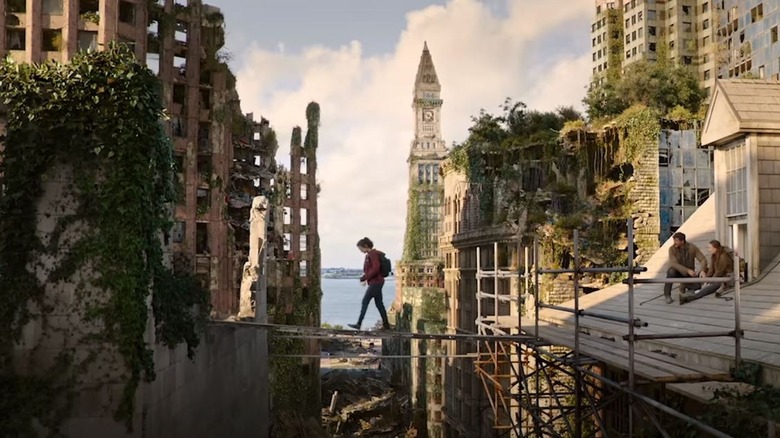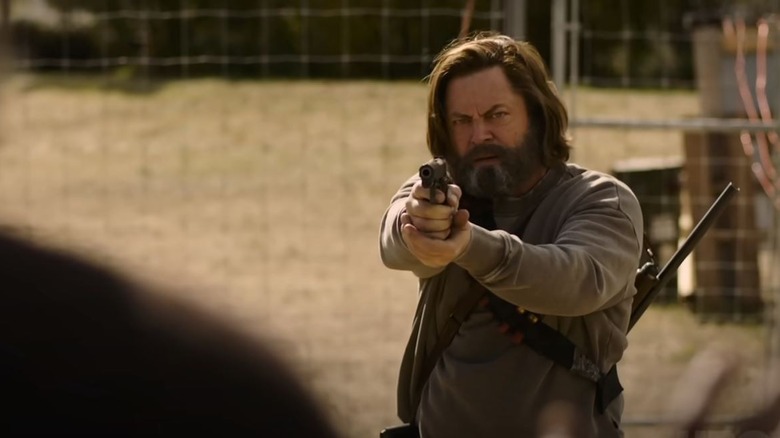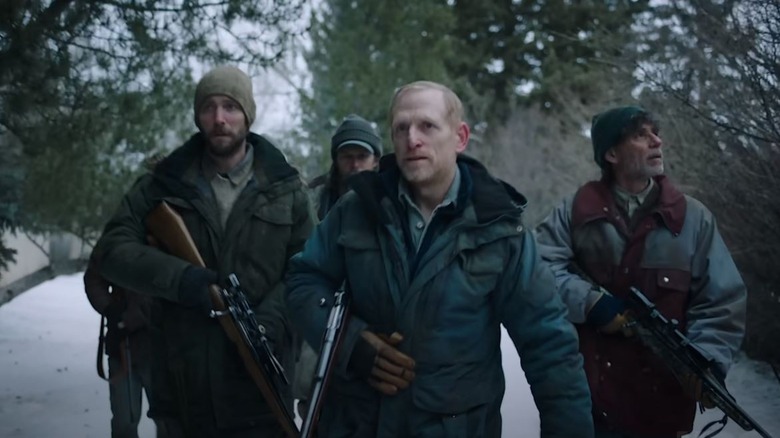HBO's The Last Of Us Has Figured Out The Secret Of The Perfect Video Game Adaptation
Contains mild spoilers for "The Last of Us" video game franchise
If you've kept up with the news about HBO's "The Last of Us," you might already suspect that the project arrives with a significant amount of hype. Game creator Neil Druckmann and "Chernobyl" helmsman Craig Mazin may very well be the best possible people to bring the bleakness of the Cordyceps apocalypse to live action, and all-purpose superstar Pedro Pascal and fellow "Game of Thrones" alumna Bella Ramsey are inspired choices to portray the central survivors, Joel and Ellie.
The stakes to adapt one of the most beloved video games in history may have been high, but "The Last of Us" succeeds -– to the point that Slashfilm's review of the show piles plaudit upon plaudit on the execution, and the BBC has declared it the king of video game adaptations. So how, exactly, does "The Last of Us" pull the proverbial rabbit out of the hat, and manage to deliver a perfect video game adaptation? Let's take a look at its secrets.
The show recognizes the challenges it faces, and addresses them with expert care ... literally
Anyone looking to adapt a monumental, beloved, and story-heavy video game such as "The Last of Us" is bound to bump into the challenge of staying faithful to the original, while creating a compelling work that stands on its own legs. As numerous video game adaptations have found to their audiences' dismay, this is a massive challenge. The end result risks either bearing little resemblance to its source material, or overloading on game-based story beats and Easter eggs, forgetting that a different medium requires a different approach. Either way, the end result can all too easily be an incoherent (if, on occasion, entertaining) mess.
Getting "The Last of Us" creator Druckmann –- a tried and tested writer, and the foremost authority on the game's world –- involved in the project, then, was a masterstroke. Who better to help the show understand which elements the live action adaptation needs to embrace, and which story beats to expand on?
The Last of Us is faithful when it needs to be, and sometimes when you least expect it
Fans of "The Last of Us" games will expect certain story beats, which the show delivers with sometimes startling accuracy. There are even moments where the faithfulness to the games will simply catch the viewer unawares, and scenes that have you mentally reaching for your controller as you watch the characters move around environs that are familiar from the game, in the exact same way their PlayStation counterparts do. The show doesn't need to include neat details like that, but it wants to — and it's easy to enjoy it all the more because of this.
The all-important, ever-evolving relationship between Joel and Ellie is also everything fans of the game could hope. Pascal's live-action version of Joel isn't any less gloomy than the game character, and Ramsey's Ellie's as snarkily upbeat as you'd imagine. The actors' chemistry is excellent, and both portray the characters' copious hidden depths with skill and nuance.
Ramsey's casting, in particular, is a stroke of genius –- not just because she embodies the 14-year-old Ellie in a powerful way that may very well grow to surpass the game's version, but because Ramsey herself is actually 19. If you're familiar with "The Last of Us Part II," which the series will hopefully end up adapting at some point, the fact that Ramsey's able to "age up" into an older version of Ellie is a true ace up the show's sleeve.
Every new plotline adds to the overall experience
However, the true genius of "The Last of Us" isn't just the way it knows when to stay faithful to the source material. The show also knows exactly when it needs to depart from it, which it does at many points –- yet never in a way that hurts the overall experience. Quite the opposite, in fact.
Being a video game, the original "The Last of Us" maintains a laserlike focus on its playable characters, and tells the story of the Cordyceps apocalypse through their eyes. The HBO show's not beholden to such narrative devices, and uses good ol' TV storytelling to expand on the story.
Again without going into spoilers, expect supporting characters from the game to receive heavily increased screen time here. Expect said screen time to make you like them even more. Expect the show to explore factions that your average video game adaptation might reduce to one-dimensional antagonists and mooks, and give them their own sets of named characters with personalities and problems. There are even scenes that explore the Cordyceps itself, and its nature as a horror that's instinctive and inevitable, rather than actively malicious.
The Last of Us is already looking beyond the video games
"The Last of Us'" decision to embrace the game's core relationship of Joel and Ellie but also focus on other survivors might be key to the show's long-term survival. At the end of the day, the source material consists of just two games and their supplementary material, both of which have around a season's worth of story. If you're familiar with the games, you also know that "The Last of Us Part II" alters the status quo in a way that will be very difficult to swallow if you're used to conventional TV storytelling. While it's true that more source material is on the way, and "The Last of Us Part III" may be closer than we thought, that game might very well change things even further. The post-apocalypse is a volatile setting, after all.
By focusing on other characters, HBO's "The Last of Us" may already be playing the long game, and trying to teach the audience to expect sudden deaths, disarray, and abrupt shifts in focus. This way, even if the show catches up with the games and ventures beyond their stories, it's already establishing that it can tell stories of its own, and create compelling characters that have no counterpart in the games.
"The Last of Us" isn't content to merely adapt -– it seems to be eyeing its chances to surpass the source material and grow into its wholly own thing. What's more, with storytelling like this, it might even succeed. Now, that's how you adapt a video game.
